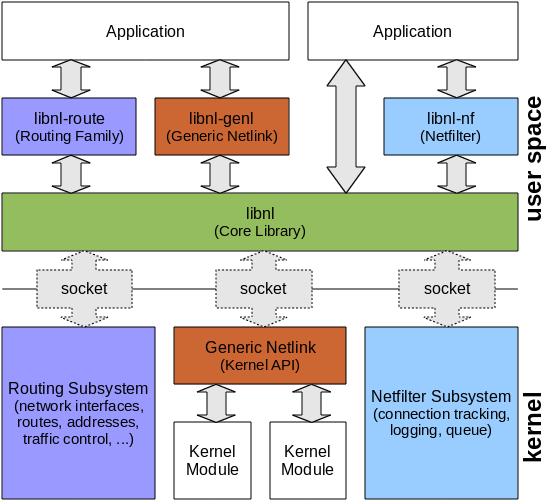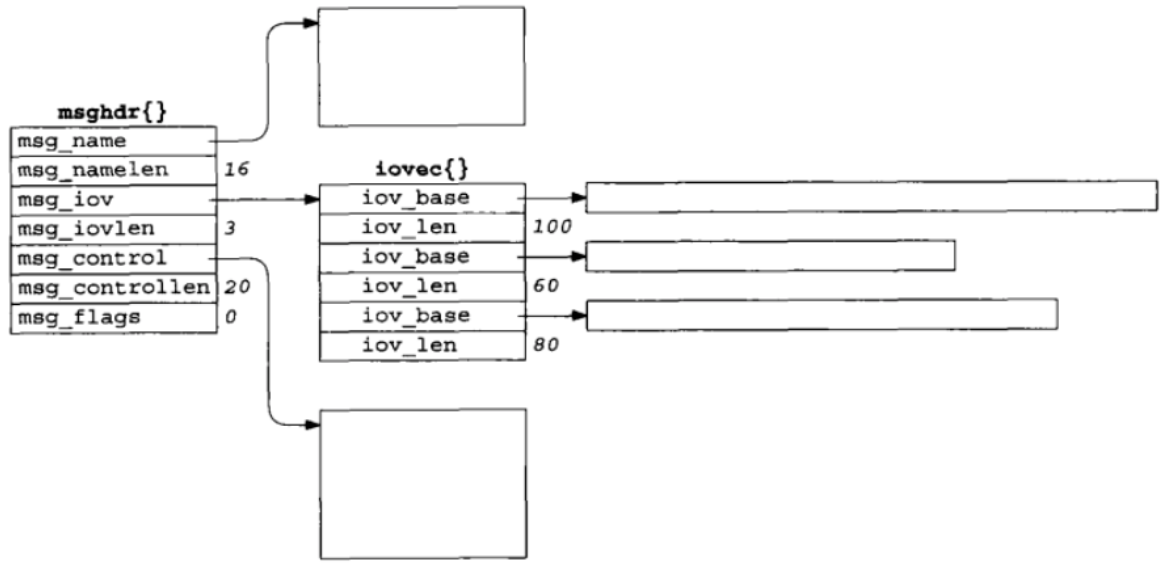Netlink
Netlink is a IPC mechanism primarly between the kernel and user space processes. It was designed to be a more flexible successor to ioctl to provide mainly networking related kernel configuration and monitoring interfaces. It uses the AF_NETLINK address family.
- libnl library Documentation
Table of contents

Netlink Core
netlink header
- total length: 32 bits
- message type 16 bits
- standard: prefix
NLMSG_, NOOP, ERROR, DONE, OVERRUN- error message includes error code and the original message header after the netlink header
- ACK message is a special type of error, with error code set to 0.
- multipart message: A multipart message has the flag
NLM_F_MULTIset and the receiver is expected to continue receiving and parsing until the special message typeNLMSG_DONEis received.
- error message includes error code and the original message header after the netlink header
- custom: >
NLMSG_MIN_TYPE = 0x10
- standard: prefix
- message flags: 16 bits
NLM_F_ACK: request ACKNLM_F_REQUEST: message is a requestNLM_F_EXCL- Do not update object if it exists already.
- seq number: 32 bits
- The library will automatically take care of sequence number handling for the application.
- port number: use PID (common practice). use 0 at the kernel side.
netlink socket
struct nl_sock *nl_socket_alloc(void);
void nl_socket_free(struct nl_sock *sk);
void nl_connect(const struct nl_sock *sk, NETLINK_ROUTE);
int nl_socket_get_fd(const struct nl_sock *sk);
int nl_socket_set_nonblocking(const struct nl_sock *sk);
nl_send_auto(sk, struct nl_msg msg)
=> nl_complete_msg(sk, msg) + nl_send(sk, msg)
int nl_send_simple(struct nl_sock *sk, int type, int flags,
void *buf, size_t size);
=> nl_send_auto
nl_recvmsgs_default(sk)
=> nl_recvmsgs(sk, cb)
=> nl_recv()
Attributes
Any form of payload should be encoded as netlink attributes whenever possible so as not to break binary compatibility.
CMSG
man netlink(7), cmsg(3)


struct msghdr mhdr;
struct iovec iov[1];
struct cmsghdr *cmhdr;
char control[1000];
struct sockaddr_in sin;
char databuf[1500];
unsigned char tos;
mhdr.msg_name = &sin
mhdr.msg_namelen = sizeof(sin);
mhdr.msg_iov = iov;
mhdr.msg_iovlen = 1;
mhdr.msg_control = &control;
mhdr.msg_controllen = sizeof(control);
iov[0].iov_base = databuf;
iov[0].iov_len = sizeof(databuf);
memset(databuf, 0, sizeof(databuf));
if ((*len = recvmsg(sock, &mhdr, 0)) == -1) {
perror("error on recvmsg");
exit(1);
} else {
cmhdr = CMSG_FIRSTHDR(&mhdr);
while (cmhdr) {
if (cmhdr->cmsg_level == IPPROTO_IP && cmhdr->cmsg_type == IP_TOS) {
// read the TOS byte in the IP header
tos = ((unsigned char *)CMSG_DATA(cmhdr))[0];
}
cmhdr = CMSG_NXTHDR(&mhdr, cmhdr);
}
printf("data read: %s, tos byte = %02X\n", databuf, tos);
}
Generic Netlink Protocol
include/net/genetlink.h
0 1 2 3
0 1 2 3 4 5 6 7 8 9 0 1 2 3 4 5 6 7 8 9 0 1 2 3 4 5 6 7 8 9 0 1
+-+-+-+-+-+-+-+-+-+-+-+-+-+-+-+-+-+-+-+-+-+-+-+-+-+-+-+-+-+-+-+-+
| Netlink message header (nlmsghdr) |
+-+-+-+-+-+-+-+-+-+-+-+-+-+-+-+-+-+-+-+-+-+-+-+-+-+-+-+-+-+-+-+-+
| Generic Netlink message header (genlmsghdr) |
+-+-+-+-+-+-+-+-+-+-+-+-+-+-+-+-+-+-+-+-+-+-+-+-+-+-+-+-+-+-+-+-+
| Optional user specific message header |
+-+-+-+-+-+-+-+-+-+-+-+-+-+-+-+-+-+-+-+-+-+-+-+-+-+-+-+-+-+-+-+-+
| Optional Generic Netlink message payload |
+-+-+-+-+-+-+-+-+-+-+-+-+-+-+-+-+-+-+-+-+-+-+-+-+-+-+-+-+-+-+-+-+
We use dropwatch as an example to show how to use genetlink. Operations defined at include/uapi/linux/net_dropmon.h and the module /net/core/drop_monitor.c
Check http://lwn.net/Articles/379903, http://lwn.net/Articles/381064 and http://lwn.net/Articles/383362
Register a Family
/* family definition */
static struct genl_family net_drop_monitor_family __ro_after_init = {
// assign the channel number when we register the family
.id = 0,
.hdrsize = 0,
.name = "NET_DM",
.version = 2,
.module = THIS_MODULE,
// or use genl_register_ops(&net_drop_monitor_family, &dropmon_ops); to register
.ops = dropmon_ops,
.n_ops = ARRAY_SIZE(dropmon_ops),
.mcgrps = dropmon_mcgrps,
.n_mcgrps = ARRAY_SIZE(dropmon_mcgrps),
};
/* operation definition */
static const struct genl_ops dropmon_ops[] = {
{
.cmd = NET_DM_CMD_CONFIG,
.doit = net_dm_cmd_config,
},
{
.cmd = NET_DM_CMD_START,
.doit = net_dm_cmd_trace,
},
{
.cmd = NET_DM_CMD_STOP,
.doit = net_dm_cmd_trace,
},
};
genl_register_family(&net_drop_monitor_family);
Sending
struct sk_buff *skb;
// or use NLMSG_GOODSIZE for size when you do not know the size of the message buffer at the time of allocation.
skb = genlmsg_new(size, GFP_KERNEL);
void *msg_header;
msg_header = genlmsg_put(skb, 0, 0, &net_drop_monitor_family,
0, NET_DM_CMD_ALERT);
// use API to put attributes
nla_reserve(skb, NLA_UNSPEC, sizeof(struct net_dm_alert_msg));
nla_put_string(skb, DOC_EXMPL_A_MSG, "Generic Netlink Rocks");
...
genlmsg_end(skb, genlmsg_data(gnlh));
genlmsg_unicast(skb, pid);
genlmsg_multicast(&net_drop_monitor_family, skb, 0, 0, GFP_KERNEL);
Receiving
msg = alloc_netlink_msg(NET_DM_CMD_STOP, NLM_F_REQUEST|NLM_F_ACK, 0);
Netfilter
#include <linux/netfilter.h>
#include <linux/netfilter_ipv4.h>
#include <linux/net.h>
#include <linux/in.h>
#include <linux/skbuff.h>
#include <linux/ip.h>
#include <linux/tcp.h>
static unsigned int my_nf_hookfn(void *priv,
struct sk_buff *skb,
const struct nf_hook_state *state)
{
/* process packet */
//...
return NF_ACCEPT;
}
static struct nf_hook_ops my_nfho = {
.hook = my_nf_hookfn,
.hooknum = NF_INET_LOCAL_OUT,
.pf = PF_INET,
.priority = NF_IP_PRI_FIRST
};
int __init my_hook_init(void)
{
return nf_register_net_hook(&init_net, &my_nfho);
}
void __exit my_hook_exit(void)
{
nf_unregister_net_hook(&init_net, &my_nfho);
}
module_init(my_hook_init);
module_exit(my_hook_exit);